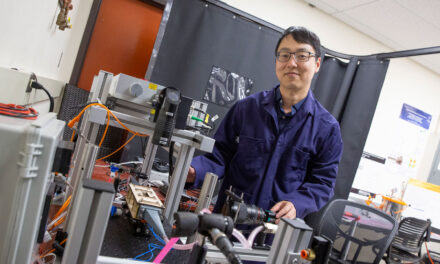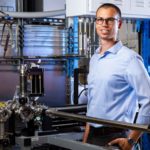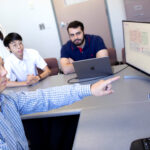
Education, government, industry alliances give root to innovation in Vietnam
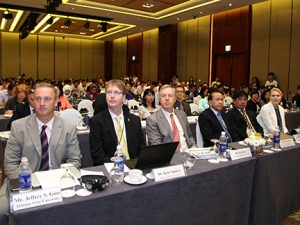
Panelists and speakers listen to opening remarks at the Vietnam Engineering Education Conference (VEEC) in Ho Chi Minh City (HCMC). From left: HEEAP Executive Director Jeffrey Goss; Ira A. Fulton Schools of Engineering Dean Kyle Squires; U.S. Ambassador to Vietnam Ted Osius; General Director, Chief of the Vietnam Ministry of Education and Training Dr. Ha Huu Phuc; Director of the Department of Science and Technology Dr. Nguyen Viet Dung, and Starbucks Vice President, Partner Resources Sara Kelly. Photo courtesy of Ho Chi Minh City University of Technology and Education (HCMUTE).
Vietnam’s quest to strengthen its presence in international engineering, research and technology innovation hinges on its ability to create partnerships between educators, industry and government, according to participants in this year’s Vietnam Engineering Education Conference (VEEC). Held last month in Ho Chi Minh City (HCMC) in a partnership between Arizona State University’s Higher Engineering Education Alliance Program (HEEAP) and HCMC University of Technology and Education (HCMUTE), VEEC attracted more than 380 participants from 85 organizations and featured two days of interactive plenary sessions, panel discussions and technical sessions.
“This year’s conference focused on workforce competitiveness — how we can train engineers not only to be highly qualified, but also to be adaptable,” said Ha Huu Phuc, General Director, Chief of the Vietnam Ministry of Education and Training South Representative in HCMC. “Collaborations between education and industry will help Vietnam meet labor needs for the Association of Southeast Asian Nations (ASEAN) in an emerging global economy.”
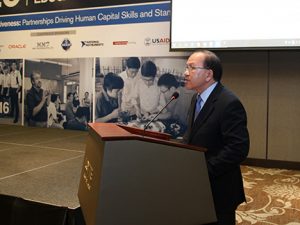
Dr. Ha Huu Phuc, General Director, Chief of the Vietnam Ministry of Education and Training (MOET), South Representative in HCMC, spoke of the need for engineers to be qualified and adaptable. Photo courtesy of HCMUTE.
In 2015, the ASEAN established the ASEAN Economic Community (AEC) to implement economic integration initiatives among its 10 member countries, and in February of this year Vietnam was one of 12 Pacific Rim countries that signed the Trans-Pacific Partnership (TPP) trade agreement. TPP’s primary goals are to promote economic growth; enhance innovation, productivity and competitiveness; raise living standards and reduce poverty, and promote transparency, good governance, and enhanced labor and environmental protections.”
“As Vietnam moves toward growing its economy in alignment with the AEC and TPP, it is vital that academic engineering programs continue leveraging public-private alliances to ensure that higher educational systems produce workforce-ready engineering graduates with international accreditation,” said Jeffrey Goss, HEEAP Executive Director. “HEEAP, the U. S. Agency for International Development and industry partners supported HCMUT in its quest to become the first Vietnamese university to be accredited by the Accreditation Board for Engineering Technology (ABET). That support continues through student scholarships, curricula innovation, conferences, training for Vietnamese faculty and leadership development.”
Cultivating partnerships
Technical sessions at this year’s conference addressed how to develop effective boards and councils, cultivating industry partnerships and investors, and research practices, development and assessment. HEEAP partner institutions, industry representatives within the TPP region, and U.S. engineering educators led technical sessions.
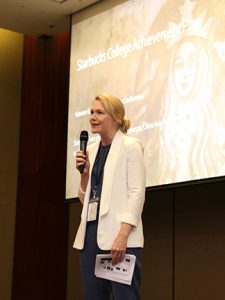
VEEC keynote speaker Sara Kelly, vice president, Starbucks Partner Resources, addressed the social responsibility of industry to increase access to higher education. Photo courtesy of HCMUTE.
Keynote speaker Sara Kelly, vice president, Starbucks Partner Resources for the Asia Pacific market within the China Asia Pacific Region spoke about the social responsibility of industry to increase access to higher education.
“We hire partners (employees) who are bright, warm and able to make an emotional connection with customers because our business actually depends on it,” Kelly said during her speech. “Based on our insights, we know that the most important motivation for customers choosing Starbucks is the human connection inspired by our baristas. It follows that doing more for our people makes business sense as well as being the right thing to do. The Starbucks College Achievement Plan is an initiative we have pioneered to attract motivated, talented, achievement-oriented people – and we hope other companies might eventually follow. Supporting our partners’ ambitions is the best investment Starbucks can make.”
Students from HCMCUTE – HEEAP’s partner and VEEC co-organizer –showcased projects built on technology platforms from National Instruments and Tektronix. Students from Lac Hong University showcased their electronic cars.
Innovation is key to economic development
During his VEEC remarks, U.S. Ambassador to Vietnam Ted Osius focused on the importance of innovation as the key to economic development. “Innovation is what keeps an economy dynamic and drives it forward,” he said.
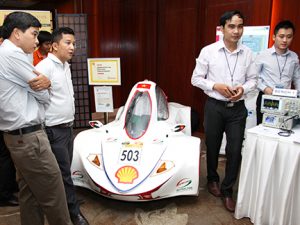
Students from Dong-Nai-based Lac Hong University presented their alternative fuel car during the conference. The car can travel 200 km (24 miles) on one litre (one quarter gallon) of methanol, and won first place in the Shell Eco-marathon competition for the Asian region. Photo courtesy of HCMUTE.
Osius outlined a three-pronged eco-system that nurtures innovation: an educational system that encourages critical thinking, rewards creativity and prizes invention through extensive support for research; government support for research and a legal framework to protect new ideas, and a private sector that creates space for the best ideas to thrive competitively.
“In the United States, the private sector contributes 65 percent of spending on applied research,” Osius explained. “The result of the academic-government-private sector nexus is the creation of an environment that allows creativity and innovation to take root, and ultimately to power the economy.”
Osius also remarked about the importance of providing students with access to fablabs or makerspaces — creative spaces that often have 3D printers, software, electronics, craft and hardware supplies and tools — pointing out that there were only two such spaces last year in Vietnam. There are now four makerspaces, with others in development throughout the country.
A recent visit to Fablab Danang impressed Osius. “There were kids there – teens and pre-teens – using equipment they would never otherwise have had access to, encouraged by dedicated instructors and sharing ideas that quite clearly fueled their imagination,” he said.
“I treasure the mini White House that Fablab Danang made for me on their 3D printer, not just because it is amazing, but also because it reminds me of the tremendous joy that those kids took that day in expressing their own creativity. They could not wait to show us their projects. It was inspiring.”
It’s in your hands
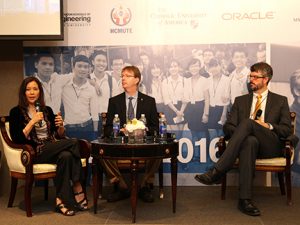
Sherry Boger, vice president and general manager of Intel Products Vietnam (left), Kyle Squires, dean of the ASU Fulton Schools of Engineering and Andrew Bell, vice president and director, educational programs, National Instruments (USA) addressed how the Internet of Things is transforming the world during the VEEC Conference last month. Photo courtesy of HCMUTE.
Sherry Boger, vice president and general manager of Intel Products Vietnam, and Andrew Bell, vice president and director, educational programs, National Instruments (USA), addressed how the Internet of Things is transforming the world and outlined its implications for the future of education. Boger, who is responsible for ramping up Intel’s $1 billion, state-of-the-art assembly and test facility in HCMC, took the opportunity to speak directly to the educators in the audience. Set to employ 4,000 employees when the factory is up and running, Boger declared, “The future of Vietnam is in your hands!”
Other speakers and panel participants included Dr. Nguyen Viet Dung, Director of the Department of Science and Technology, HCMC, and Rena Bitter, the U.S. Consul General of HCMC, who engaged in a discussion about the workforce landscape of the ASEAN economic community and why science and technology capacity are important.
“A number of reforms in this university started in partnership with ASU,” said Dr. Do Van Dung, Rector of HCMUTE. “A concrete example is the establishment of HCMUTE’s School of Innovation and Entrepreneurship. Also, the implementation of online, mobile and blended learning has created a revolution for the teaching and learning culture in the university.”
HEEAP is administered by the Global Office of Extended Education (GOEE) in the Ira A. Fulton Schools of Engineering at ASU. In addition to founding partner Intel, sponsors now include the Vietnam Ministry of Education and Training, Saigon Hi-Tech Park, Siemens, Danaher, Cadence, National Instruments and Pearson.
Media Contact:
Terry Grant, [email protected]
Ira A. Fulton Schools of Engineering



